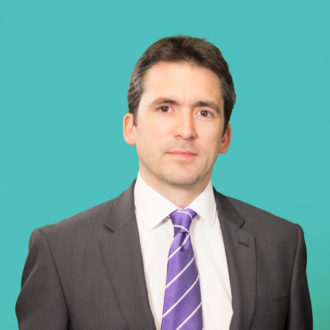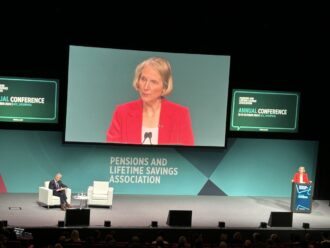Assessing the macro-economic environment, leading assets owners highlighted a mixed bag of factors when assessing the situation and their own investment approaches at the PLSA’s investment conference.
Beginning with first principles, Dan Mikulskis, chief investment officer of People’s Partnership, the provider of The People’s Pension, said his fund is an 80/20 split between growth and fixed income.
“Having said that, fixed income is becoming a lot more important. We are broadly an index tracker investor, it is great value for money for our members,” he added.
Mikulskis said some of the things that keep him awake at night in regard to the fund have already happened. “We have inflation-based targets for our fund – so high inflation makes those hard to meet, so that is a worry.”
Also, he noted: “Super low fixed-income yields are hard to build funds to deliver a decent pension, so that is a bit of a worry.”
Two areas Mikulskis said he was particularly looking at this year will be fixed income and emerging markets.
Thinking about risk
Padmesh Shukla, chief investment officer of the final salary TfL Pension Fund, said the scheme has an interesting investment mix: with a commitment to alternatives – 30% in private markets, a percentage in liquid alternatives, 20% in credit, of which 25% is allocated to private credit, and 30% in equities.
In addition, the fund has a large overlay programme to hedge all kinds of risk: inflation, rates, foreign exchange and equities.
“There has been a clear shift in how we think about key risks and how we manage them,” Shukla said.
Leandros Kalisperas, the chief investment officer at the West Yorkshire Pension Fund, said his fund is an in-house managed scheme. In terms of investments, Kalisperas said he liked to look at risk factors.
“The benchmark is broadly 60% in public equities, 20% in fixed income and credit, and 20% in private markets. We retain a home bias within our public market equities, but we have moderated that within the benchmark,” Kalisperas said.
“That will have implications on how we manage money,” he added. “How do we lean into the themes that are going to be important? Perhaps our home bias in public markets has anchored us looking at the UK as one of our risk factors.”
Being a super tanker
When asked about being a long-term investor versus short-term political and economic trends, Kalisperas said: “Does it keep me up at night that [Donald] Trump may be president? No it doesn’t. In terms of that cliché of being a super tanker, which you are when you are close to £20bn, you are loath to be taking on lots of transactions on behalf of your members.”
On the long-term focus, Mikulskis noted there are two sets of things at play. “There are certain things that are entertaining to us and grab our attention, and then there are the set of things that matter for long-term investors, and they don’t overlap very much. And that is the big problem. Because so much of what you see is a distraction,” he said.
Shukla agreed, observing there is discipline in being focused on the long term and avoiding the wider noise investors face every day. “It is a challenge. Every time you hear the noise it is a case of going back to your investment beliefs,” he said.
Issues surrounding ESG were also cited as being important. ESG, Shukla noted, is a key area for the TfL Pension Fund. “We have quite ambitious net-zero targets, with a 55% reduction for a baseline of 2030 and net zero by 2045.”
On ESG, Kalisperas added: “The whole aspect of local and impact investment is important for West Yorkshire to progress,” he said.
“We have seen the Greater Manchester Pension Fund make great strides in how to invest on a locally place-based impact basis and that is something I am keen for West Yorkshire to collaborate with our northern partners on and elsewhere, to further our ambitions,” Kalisperas added.
Despite all the talk of market upheaval, investors have to look at upside scenarios as well, Mikulskis added. “The markets have had a lot thrown at it in the last few years and we are at all-time [market] highs and there are reasons to be bullish globally.”





Comments